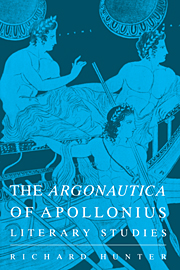Book contents
- Frontmatter
- Contents
- Preface
- List of abbreviations
- 1 Introduction
- 2 Modes of heroism
- 3 Images of love
- 4 The gods and the divine
- 5 The poet and his poem
- 6 The Argonautica and its Ptolemaic context
- 7 Argonautica and Aeneid
- Appendix: ἓν ἂισμα διηνκές: Aristotle, Callimachus, Apollonius
- Bibliography
- General index
- Index of passages discussed
5 - The poet and his poem
Published online by Cambridge University Press: 02 December 2009
- Frontmatter
- Contents
- Preface
- List of abbreviations
- 1 Introduction
- 2 Modes of heroism
- 3 Images of love
- 4 The gods and the divine
- 5 The poet and his poem
- 6 The Argonautica and its Ptolemaic context
- 7 Argonautica and Aeneid
- Appendix: ἓν ἂισμα διηνκές: Aristotle, Callimachus, Apollonius
- Bibliography
- General index
- Index of passages discussed
Summary
No feature of Alexandrian poetry has attracted more attention in recent years than the self-conscious literariness of its presentation, the constant demand of poet-narrators to be recognised as the controlling force behind the words of the text. Here Apollonius has much in common with Callimachus, perhaps most obviously in his invocations to the Muse and his loudly pious silences (1.919–21, 4.247–50). More interestingly, the tension between the scheme of the epic which parades the telling of all the Argonautic adventures – note the ‘naive’ confidence of 4.1776–7, ‘no other challenge confronted you as you sailed up from Aegina’ – and the open selectivity and imbalance of the narrative makes the process of narration itself an object of interest: Apollonius wants the stitches in his rhapsodia, and who controls them, to show. The whole epic puts on display what is problematic in the Aristotelian demand for ‘oneness’; at one level, the Argonautica is a demonstration (an epideixis) of the techniques and challenges of epic narration. The subjects with which I shall be concerned in this chapter are thus to some extent arbitrary, as it will become clear that many themes recur from earlier chapters; ‘poetic voice’ is not a separable part of this epic (at least) – it pervades every aspect.
THE EPIC VOICE
‘Epic objectivity’ is a standard phrase of Homeric criticism.
- Type
- Chapter
- Information
- The Argonautica of Apollonius , pp. 101 - 151Publisher: Cambridge University PressPrint publication year: 1993



